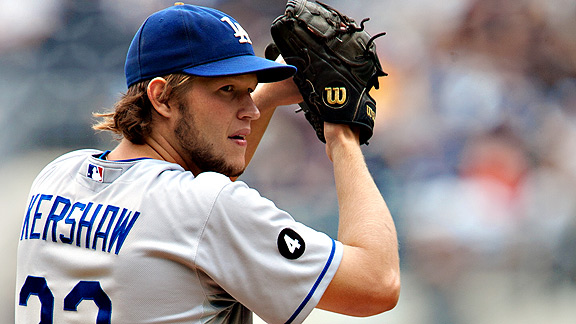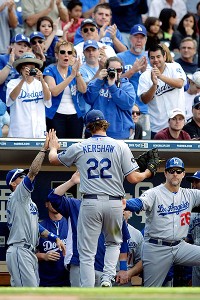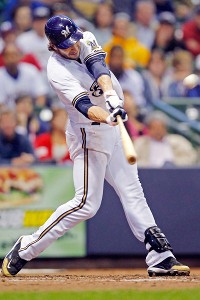Dear Voter:
There is no clear-cut definition of what Most Valuable means. It is up to the individual voter to decide who was the Most Valuable Player in each league to his team. The MVP need not come from a division winner or other playoff qualifier.
The rules of the voting remain the same as they were written on the first ballot in 1931:
1. Actual value of a player to his team, that is, strength of offense and defense.
2. Number of games played.
3. General character, disposition, loyalty and effort.
4. Former winners are eligible.
5. Members of the committee may vote for more than one member of a team.
– Baseball Writers Association of America official site
* * *
The idea that an MVP must come from a contending team is completely invented. It is not part of the rules of the award nor its roots. Nor is it part of baseball history, unless you’d like to go back and take Ernie Banks’ MVP awards away from him.
Nevertheless, the idea persists among many that an MVP must come from a team that, at a minimum, is in the thick of a pennant race. It comes from people who believe, apparently, that if a tree falls in the woods, it does not make a sound.
Guess what. It makes a sound.
* * *
If, instead of voting for the player with the best performance, you vote for only the player with the best performance on a potential champion, you’re arguing that anything that takes place outside the spotlight doesn’t matter.
Think of the implications of that.
I have three kids. Sometimes I watch them play. Right now they’re playing downstairs while I type this. If one of my children does something nice for another, that is a good thing, whether I’m in the room or not. The value is equal. To think otherwise is to send a message that your actions only matter when people are watching.
Baseball asks you to run out a ground ball even when you’re sure you’re going to be out. It asks you to put your best effort even if you’re team is 50 games out of first place. The sport asks this, for one, because fans and TV networks have been promised this in exchange for their hard-earned money. And because it’s a belief that virtually all of us share. Do your best.
To then turn around and say that “Oh, by the way, we aren’t paying attention to you anymore, so your effort doesn’t matter,” is nonsensical.
And it’s not a matter of degree. Even though you have an adjusted OPS+ of xxx, playing on a contending team doesn’t mean you add three points, or 10 points or 24.6 points. The value of the same performance is the same regardless of where it took place.
Sending my kids to college is so much more important to me than buying my kids the Webkinz stuffed animals they love. Nevertheless, $10 I put away for my kids’ education is not more valuable than $20 I spend on the toy. No, $20 is more than $10.
* * *
All that being said, the idea that the Dodgers’ games have been meaningless this season is a complete fiction.
They were clearly meaningful in April and May, before anyone had broken free in the National League West.
They were also meaningful later in the season, even after the losing began. If not for Arizona’s remarkable breakthrough this season, something that no one could have guaranteed, the Dodgers’ second-half rally would have put them in the thick of the race. With five games to go in the season, the Dodgers have 79 victories, which means they still have the chance of matching their division-winning total of 2008 and surpassing the Padres’ division-winning total of 2005.
When, exactly, were the Dodgers supposed to stop trying?
But even if you concede that this team was not going to go to the playoffs, the indispensable point is this: The Dodgers have had meaning all season as an opponent.
From April through September, the Dodgers played games that mattered because winning or losing had a direct effect on the pennant races. In addition to their own postseason dreams, there were also postseason dreams for their opponents. On Tuesday, San Francisco came to Los Angeles, having won eight games in a row in making a late run for the playoffs. With two out in the first inning, Matt Kemp singled and then scored a run off Tim Lincecum in what became a 2-1 victory that severely damaged their hopes.
Then, a day after the Giants beat the Dodgers to keep their hopes alive and a day before San Francisco had a showdown series with Arizona, Kemp went 4 for 4 with three doubles and a home run in a Dodger victory that was crushing for the Giants.
You want to tell San Francisco’s fans that that didn’t count?
The Dodgers were not eliminated from postseason contention until September 17. Every game they played to that point counted for themselves. In their entire 2011 season, they will have played eight games – two against Pittsburgh, three in their current series against San Diego and three to finish the season against NL West champion Arizona – that had no bearing on the postseason (though keeping in mind they still mean something to the fans who watch).
Ryan Braun’s Milwaukee Brewers, who like the Diamondbacks clinched their division title Friday, will play five games this season that have no bearing on the postseason.
That’s a three-game difference out of 162. Three games in which Kemp’s performance mattered less to the playoff race than Braun’s.
* * *
Pressure of the pennant chase? I don’t even need to bother with this one, because Joe Posnanski already destroyed this argument:
… This line — that it’s easier to put up numbers without pennant pressure — is a lot like that. Nobody can possibly believe this. First of all, there’s the obvious flaw: If it were easier to put up numbers in non-pressure situations, then players would consistently and obviously have better years on lousy teams than they do on good ones. Does this ring even the slightest bell of truth? Does anyone believe that Derek Jeter would have put up better numbers had he played for Kansas City? Does anyone believe that Albert Pujols would be so much better if he had spent his career playing in the carefree world of the Pittsburgh Pirates? Roy Halladay was great for mediocre Blue Jays teams and is great for outstanding Phillies teams. Hank Aaron was the same great player with the same great numbers when Milwaukee won, when Milwaukee almost won, and when Milwaukee wasn’t very good at all. …
If you’ve read this blog at all you know: I’ve covered a lot of bad teams in my life. I’ve been around some good ones, too. And as far as “pressure” goes, well, from my observation, it’s not even close. There is infinitely more pressure on players on lousy teams than on good ones. Obviously, this depends on how you define pressure, but if the textbook definition of pressure is “the feeling of stressful urgency cause by the necessity of achieving something,” well, absolutely, there’s way more pressure on the lousy teams.
… Think about it: What pressure is there on players in pennant races? The pressure to win? Sure. But players come to the ballpark energized. Everyone on the team is into it. The crowd is alive and hopeful. The afternoon crackles. Anticipation. Excitement. There’s nothing in sports quite like the energy in a baseball clubhouse during a pennant race. Players arrive early to prepare. Teammates help each other. Everyone’s in a good mood. There’s a feeling swirling around: This is exactly the childhood dream. The added importance of the moment could, in theory I suppose, create extra stress. But the reality I’ve seen is precisely the opposite. The importance sharpens the senses, feeds the enthusiasm, makes the day brighter. Baseball is a long season. Anything to give a day a little gravity, to separate it from yesterday, to make it all more interesting — anything like that, I think, is much more likely to make it EASIER to play closer to one’s peak.
A losing clubhouse? Exactly the opposite. The downward pressure is enormous and overwhelming — after all, who cares? The town has moved on. A Hawaiian vacation awaits. Teammates are fighting to keep their jobs or fighting to impress someone on another team or just plain fighting. The manager might be worried about his job. The reporters are few, and they’re negative. Smaller crowds make it easier to hear the drunken critics. Support is much harder to come by, and there is constant, intense force demanding that you just stop trying so hard. After all: Why take that extra BP? You’ve got the swing down. Why study a few extra minutes of film? You’ve faced that hitter before. Why take that extra base? Why challenge him on that 3-1 pitch? Why? You’re down 9-3 anyway.
It’s absolutely AMAZING to me when a player puts up a fantastic year even when the team around him stinks. …
The Dodgers, frankly, deserve a special recognition in this category. If there were a Downward Pressure World Series, they surely would have won. With unsurpassed nightmares in the owners’ suite and a fan base in outward revolt, with numerous devotees boycotting games, with expectations for success absolutely disappearing, late summer in Los Angeles should have been the most soul-sapping time for a player in the franchise’s 54 seasons here, even more so than the 99-loss 1992 season played in the aftermath of the city’s riots.
Instead, Kemp, not to mention Clayton Kershaw and some others, bore down and did the only thing anyone can ask – be the best they can be. They were better than anyone had a right to expect.
It is, in terms of environment, easily as impressive an achievement as what the same performance would have been on a season-long contender.
* * *
I’m not saying it’s a stupid question to wonder if a player on a non-contender should get voted MVP? Even Vin Scully asked the question aloud during Friday’s Dodger broadcast.
The problem is not with the question. The problem has been with the answer.
If the answer is, “The goal is to win a championship, and any performance that does not come with a championship isn’t the most valuable,” you’re saying that Matt Kemp wasn’t valuable because Juan Uribe was terrible. Does that make any sense? “Because my next-door neighbor is a bad guy, it doesn’t matter how good I am.”
Value, clearly and cleanly, comes down to this. What would you rather have? If you knew everything there was to know about the 2011 regular season in advance, which player would have been your first pick before Opening Day?
If you think Ryan Braun was a better player than Matt Kemp this year, vote for him.
If you think Braun was absolutely, indivisibly, incontrovertibly equal to Kemp this year, and you want to use the fact that Braun is going to the postseason as the only thing that can break the deadlock, vote for him.
But if you think Kemp was better than Braun, by a mile or a millimeter, and you vote for Braun, you’re making a mistake. You’re not upholding the values of this game or our society – you’re subverting them.






